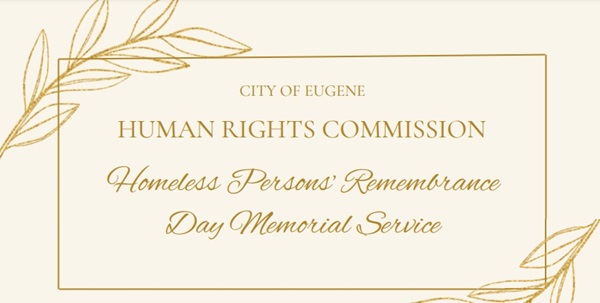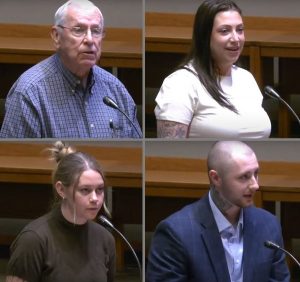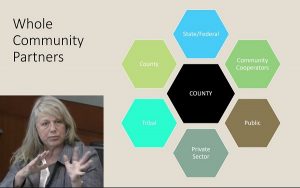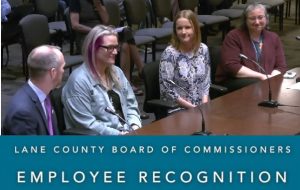Eugene remembers those who died homeless
9 min read
Eugene’s Human Rights Commission marked the longest night of the year Dec. 21, with a homeless memorial service in the park blocks downtown.
Scott Lemons (Human Rights Commission chair): Thank you all for being here today. We are all here. It’s Dec. 21, the first day of winter, but also the longest night of the year. People in our community, in your community, will die without a home this year. An entire generation, me included, has been raised in a world where it is normal to see people sleeping on a street.
[00:00:38] All too often, those who die on the streets are not connected to family or to support systems who can hold a funeral or properly honor them.
[00:00:49] While we understand the importance of every life, we recognize the reality of conditions and systemic barriers that individuals and families experiencing homelessness face.
[00:01:01] National Homelessness Persons Memorial Day is a day to remember those who have died during the year while unhoused, unsheltered, living in shelters, transitional housing, or other uninhabitable places and spaces without a place to call home or the support system to do so.
[00:01:24] Over the past 100 years, hundreds of cities representing more than 30 states and the District of Columbia have participated in the National Human Rights Person Memorial Day. Let’s make this a year of increased awareness, and more importantly, advocacy, by organizing in our communities to memorialize the lives that have been lost across the nation, but also to call for meaningful policy changes to ensure that no life is lived or lost in homelessness ever again, especially in the richest nation in the country.
[00:02:00] John Q: Homeless advocate and KEPW News Anchor Richard Self.
[00:02:04] Richard Self: I’m here first to address the passing of one of the most prolific advocates—obnoxious advocates—one of the best ones we’re ever going to see, and we’ll see nobody like this again. Eric Jackson passed. And Eric Jackson was an influence on so many different levels that what he did influenced what we have now, including respite centers.
[00:02:34] Eric Jackson was the first; we have Safe Sleep Sites because he enacted other things and just the fact that he was making such a statement that the people who make the rules and own the gold had to pay attention to him.
[00:02:53] And it was my honor to know him, and we’ll never have anybody like that again. And I am very saddened, and we’ll miss him very much.
[00:03:04] I also wanted to quote from the head of the United States Council on Homelessness, Executive Director Jeff Olivet’s remarks that he has read in Washington tonight. Just some of the remarks, I’ll use some of his closing:
[00:03:25] ‘It’s not enough to remember the people we miss. There’s an epic fight ahead for the living. Fighting for the living means saying over and over that housing is health care. Housing is health care. Say it with me: Housing is health care.
[00:03:42] ‘Housing is also a basic human right. Housing and services work. Prevention is the key to solving homelessness. This is the longest night, the winter solstice, and it may be inescapable, but these deaths are not inevitable.
[00:04:00] ‘Despite the feelings of exhaustion, trauma, and uncertainty, so many of our friends and neighbors may feel tonight a different future is possible. A better future awaits us. We have only to seize it. So on this Homeless Persons Memorial Day, we mourn the lost. We renew our commitment to a world where housing is a right, not a privilege. A world where we care for one another, regardless of who we are, regardless of where we live, and how we got there. A world where love triumphs.’
[00:04:39] I thank you.
[00:04:40] John Q: From Egan Warming Centers, David Strahan.
[00:04:43] David Strahan: I’m starting my second year at Egan and as a volunteer in Egan, you see things sometimes you wish you could unsee. And some things you’re really glad you did see.
[00:04:52] And, besides the honor of being able to say that I’m part of Egan Warming Center, I want to give some honor to some of the people that make it possible for the Egan Warming Center to operate.
[00:05:07] First off, I know we’ve got some volunteers out here. Those who are volunteers, hold your candle up. Hold your hand up. Thank you. All of you. Because the Warming Center is not going to happen without you.
[00:05:19] All the folks here who’ve stayed in a warming center, raise your hand, raise your candle. These are the people you serve. These are the people on the street that we help. The ones that we don’t see are the ones that we have to read their names of afterwards.
[00:05:32] They’re the Mama Carries. They’re the Dirtys. They’re the Pops. They’re the Hunters. They’re the people that we often only know them by their nicknames. Because maybe we didn’t take the time to hear their story or hear how they got where they’re at.
[00:05:45] Egan Warming Center gives these guests a chance to do that in a safe place with a meal, with a bed. And it takes a strong community to do that. It takes strong community partners to do that. LTD is one of those partners. The volunteers that raise their hand is one of those partners. The local stores in the area are actually partners because they deal with the increased traffic in our areas.
[00:06:11] And the police are also our partners because oftentimes they’re the ones finding people that need to be in our shelter. And sometimes they’re the ones who find those who have passed. They don’t always die in a hospital. Our homeless don’t always get that nicety.
[00:06:29] But we need to know their names. We need to find out who they were. And it’s up to you as volunteers and community members to hear their story and make sure their story doesn’t die.
[00:06:39] Again, on this solstice night, the longest night of the year, it’s a perfect night to think back about those who don’t have a place. Those who don’t have a warm space. Egan Warming Center gives these people a place to be for a night, a meal, a sandwich in the morning, and a chance to start a new day with a new outlook on life.
[00:06:59] And I’m honored to speak on their behalf tonight. They are the only low-barrier freezing winter shelter in this town.
[00:07:06] When we know we have 3,500 people on average looking for shelter at any one time; when we know we have a maximum of about 1,000 beds available; we know there’s people falling through the cracks.
[00:07:18] And on freezing nights, with the volunteer levels we have, Egan’s able to provide that. And that’s because of volunteers and a compassionate, caring community. The myriad of volunteers that we cycle through, the people working behind the scenes, the schedulers planning all the volunteer hours to make it happen…
[00:07:37] You as volunteers are the reason that we’re able to open these centers, that we’re able to offer those services to the homeless.
[00:07:43] And you know what else that happens at Egan Warming Centers? Sometimes people make a connection. They make a connection with somebody that knows about housing. They make a connection with somebody that knows about the medical help that person may need. They may have just the phone to make that connection, to get in contact with somebody’s loved one.
[00:08:01] And I’m telling you, as a volunteer at the Egan Warming Center, you’re going to hear these stories, and you’re going to know after going home a night of volunteering. that you probably saved somebody’s life, because that’s what our volunteers do. We keep people alive for another day and another day and another day.
[00:08:18] So in honoring those that have passed before us, I mentioned the Mama Carries, the Hunters. Those are the folks who lost their battle, some of them just hours or days away from getting into shelter. So in years past, we rang a bell for everybody that’s lost in this year. And sadly, as those number of homeless continue to die on the street, those numbers start gaining outside of countability.
[00:08:48] We don’t have an accurate number of how many people have died on the streets in this city because they’re having to hide, because we don’t have appropriate shelter for them. And it’s people here with their voices that can make that happen. This world has the collective wealth to house everybody that wants to be housed.
[00:09:08] But what we don’t have is the collective will to make that happen, to talk to the city administrators, to talk to those people that have their hands on the purse strings, to make a true low-barrier shelter a possibility for everybody that wants to be in it.
[00:09:23] So: Happy Solstice.
[00:09:25] Don’t be afraid to talk to the homeless. Ask them their name. Ask them their story. And if it feels strong enough in your heart that you can do it, sign up for an Egan training, if you haven’t already, and volunteer. St. Vincent de Paul and Egan Warming Center thanks you for your volunteers. And, someday I hope we don’t have to have these speeches.
[00:09:47] Lucy Vinis (Eugene mayor): When I read this list of names, there are many that I don’t know, but there is one that I know quite well, as many have spoken before, and that is Eric Jackson. And I will say that Eric Jackson was relatively new to town when I was a new mayor, and he was someone who came to meet me right away, and I had many conversations with him in those early years.
[00:10:10] And he was an incredibly, yes, he was, he could be an obnoxious advocate, no doubt about it. But he was persistent. He was eloquent about the need. He was very clear. He was a loud and proud voice on behalf of people whose voices were not otherwise heard. And he did pressure this city into taking action and much more action and the action is visible.
[00:10:37] And as Richard mentioned, you know, the Dusk to Dawn in particular was a particular response to Eric’s work immediately. And so he had a huge positive impact on this community and on people’s lives. And it is tragic that that we have lost him because he had more work to do and he was eager and prepared to do that work.
[00:11:01] We are here. I am here representing the city as a moment to acknowledge the efforts that we make and also our inability to meet, fully meet the need and recognize and commit that we have a role as a city to continue to try to provide the shelter, the housing, connect people to services to provide the assistance they need. And the scale and the scope of it is very challenging for the city, but it is a deep commitment.
[00:11:35] We don’t always get it right. We learn from experience and we seek to do better. And I’ll just say, you know, in the book of life, in the book of all of our lives, we hope as a city that this chapter of homelessness, this chapter of homelessness in our society is just a chapter in that book of life and that the subsequent chapters are better chapters.
[00:12:02] And we are here tonight to acknowledge all of the failings that led all of these people to suffer so, to die of cold, die of illness, die of despair and sadness, to die alone; that we do not want that to be the final chapter for other people’s lives. We want the final chapter for their lives to be that they were restored.
[00:12:32] They were restored to family. They were restored to help. They were restored to safety and to shelter. And that is our commitment. That needs to be our commitment as a community. So I will take a moment. We will take some time now to read the names that we have of the people who have passed. We will do this slowly.
[00:12:52] I’ll read a name. We’ll ring the bell and we’ll have a moment of silence so that you can say your, whatever, your silent thought or prayer is for that person so that that that life is honored and remembered.
[00:13:08] Angel. Brett. Clifford. David. Delanna. Dolores Peacock. Dwayne Woods. Eric Jackson. Eugene Phillips. Ginger Hess. James Brandon. Jeanette. Jeff. Jesse Beasley. Joe Izell. John Garrett. Kristy Fuller. Lane. Mark. Ranger. Rankin. Richard Hotchkiss. Scott. Tennessee. Tom Campbell.
[00:14:53] Rest in peace.
[00:14:58] John Q: The memorial ceremony host was Blake Burrell. It was recorded by Todd Boyle, and concluded with the Raging Grannies.
[00:15:05] The Raging Grannies: Amazing Grace, how sweet the sound that saved a wretch like me. I once was lost but now I’m found, was blind but now I see.



